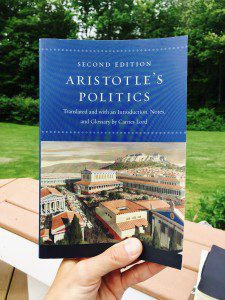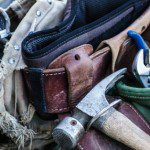My convictions about our robot future have vacillated, from fear of robots enervating humanity even further, to respect for the genius of their makers, to now wan hope that they may help revive the household economy.
Regarding the last of those swings, here’s something I stumbled across in Aristotle’s Politics–Book One, Chapter Four. The Philosopher, at Aquinas called him, anticipated and even hoped for a robot future. Don’t believe me? This from his treatment of productive property, read on:
“Now property is part of the household, and the art of acquiring it a part of household management (for without the necessary things it is impossible either to live or to live well); and just as the specialized arts must of necessity have their proper instruments if their function is to be performed, so too must the household manager. …A possession too, then, is an instrument for the purpose of life, and one’s property is an aggregate of such instruments;…. Every subordinate, more over, is an instrument that wields many instruments, for if each of the instruments were able to perform its function on command or by anticipation as they assert those of Daedalus did, or the tripods of Hephestus (which the poet says, ‘of their own accord came to the gods’ gathering), so that shuttles would weave themselves and picks play the lyre, master craftsmen would no longer have need for subordinates, or masters for slaves. Now the instruments mentioned are productive instruments, ….” (Bold, mine.)
 Aristotle’s treatment of the household economy is usually dismissed without comment due to his advocacy of “natural slavery”. Reading between the lines should reveal to a careful reader that Aristotle was himself uncomfortable with slavery and felt a need to justify it. But here we see that he could imagine a world where they would no longer be necessary–manumission through technology even two and a half millennia ago was plausible.
Aristotle’s treatment of the household economy is usually dismissed without comment due to his advocacy of “natural slavery”. Reading between the lines should reveal to a careful reader that Aristotle was himself uncomfortable with slavery and felt a need to justify it. But here we see that he could imagine a world where they would no longer be necessary–manumission through technology even two and a half millennia ago was plausible.
Where does the household economy come in? Productivity. Premodern households were productive, and often self-sufficient to a degree we can’t imagine today. Robots, particularly cheap ones, powered by cheap energy (think solar), may make a degree of independence possible we haven’t seen in ages–literally, as they say. Obviously households would be dependent upon the new tech–but households have always been dependent upon technology.
—
And now for something only tangentially related. I was interviewed last week by Chris Arnzen of Iron Sharpens Iron radio. Here’s a link to the interview. Waring: it is a two hour radio show punctuated with advertising. But I’d say nearly an hour and a half is genuine content. I’ve been a guest on Chris’s show in the past, he alludes to that. And I’m scheduled to be on the show again in July.
Enjoy.

















